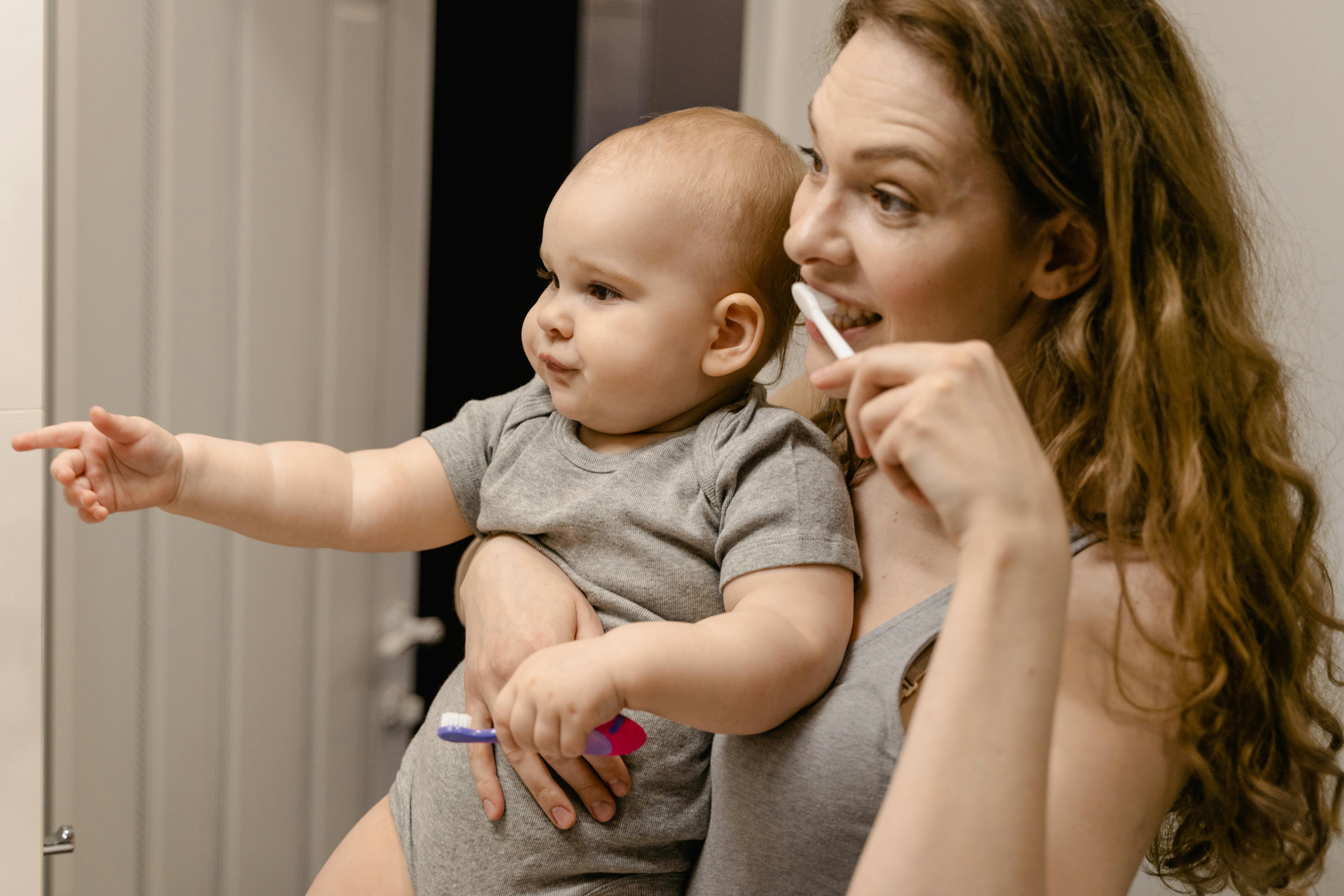Cavities in baby teeth can have a serious impact on permanent teeth. While many people believe that cavities in baby teeth aren’t a big deal because they will eventually fall out, this is not the case. Cavities can cause permanent damage to the adult teeth that are coming in and can even lead to long-term health problems. In this article, we will discuss how cavities in baby teeth affect permanent teeth and why it is important to take proper care of your child’s baby teeth.A cavity is a hole or hollow area in a tooth caused by decay. The decaying of the tooth enamel and dentin leads to the formation of a cavity, which may allow bacteria to enter the inner layers of the tooth and cause further damage. Cavities can cause pain, sensitivity, discoloration, and other complications if left untreated.
Baby Teeth vs Permanent Teeth
Baby teeth, also known as primary teeth, are the first set of teeth that a child grows. They typically begin to erupt between 6 and 12 months of age, although this can vary depending on the individual. Permanent teeth, or adult teeth, are the second set of teeth that eventually replace the baby teeth and remain in the mouth for life.
Baby teeth are typically smaller and more delicate than permanent teeth. They contain less enamel and have narrower roots than permanent teeth, making them more prone to decay and damage. Baby teeth also come in at different times over a period of several years, whereas permanent teeth all come in at once when the child reaches maturity.
Permanent teeth are much stronger and more durable than baby teeth due to their thicker layer of enamel. They are also larger and have wider roots compared to baby teeth, making them less prone to decay or damage. Permanent teeth also stay in place until age 40-50 when they may start to deteriorate due to age-related issues such as gum disease or tooth decay.
In summary, baby teeth and permanent teeth differ in size, shape, strength, durability and placement in the mouth. Baby teeth are smaller with narrower roots while permanent teeth are larger with wider roots that stay in place for life. Additionally, baby teeth tend to be more susceptible to decay while permanent teeth have a thicker layer of enamel which makes them stronger and more resistant to damage.
What Causes Cavities in Baby Teeth?
Cavities in baby teeth occur when bacteria in the mouth combine with sugars and starches from food and drinks to create an acid that wears away at the tooth enamel. Poor oral hygiene, such as not brushing and flossing regularly, can lead to a buildup of plaque and bacteria on the teeth, which increases the risk of cavities. Frequent snacking on sugary foods or drinking sugary drinks can also contribute to cavities. In addition, medical conditions that reduce saliva flow can lead to an increased risk of cavities in baby teeth. It is important for parents to practice good oral hygiene habits with their children and limit their consumption of sugary snacks and drinks to help prevent cavities.
Regular visits with a dentist are also important for children as they grow so that any signs of tooth decay can be identified and treated early. If left untreated, cavities in baby teeth can cause pain, infections, damage to other teeth, and difficulty eating or speaking.
Signs and Symptoms of Cavities in Baby Teeth
Cavities in baby teeth can affect a child’s oral health and are caused by bacteria that produce acid and damage tooth enamel. Early detection of cavities can help prevent more serious problems down the road. The most common symptoms of cavities in baby teeth include discoloration, pain or sensitivity, bad breath, and visible holes or pits in the teeth.
Discoloration is one of the first signs that a cavity may be present. Teeth may appear yellow, brown, or black instead of their usual pearly white color. Pain or sensitivity is another sign that should not be ignored. If your child experiences pain when they eat something sweet or hot, then a cavity may have formed.
Bad breath is another symptom of cavities in baby teeth that parents should look out for. If your child’s breath has an unpleasant odor even after brushing their teeth, this could be an indicator of a cavity. Lastly, visible holes or pits in the teeth are often the most obvious signs of tooth decay. If you notice any of these signs or symptoms, it is important to contact your dentist right away to have them examined and treated if necessary.
Preventing Cavities in Baby Teeth
Taking care of your baby’s teeth is important for their overall health. Cavities can cause pain, infection, and even tooth loss if left untreated. Fortunately, there are some simple steps parents can take to help prevent cavities in baby teeth.
Starting early is key. As soon as the first tooth appears, parents should begin brushing their child’s teeth with a soft-bristled brush and a tiny bit of fluoride toothpaste. Parents should also clean their baby’s gums after each feeding with a wet washcloth or gauze pad. This will help remove plaque and bacteria that can lead to cavities.
Parents should also limit their child’s sugary snacks and drinks, as well as juice. If your child does have juice, limit it to 4-6 ounces per day and avoid letting your child sip on it throughout the day. It’s also important for parents to monitor how often their children snack throughout the day, as frequent snacking can increase the risk of cavities.
Brushing twice a day is essential for preventing cavities. Parents should brush their child’s teeth for two minutes each time with fluoride toothpaste and floss daily to remove plaque from hard to reach areas between the teeth.
Regular dental check-ups are also important for cavity prevention. A dentist or dental hygienist can check your child’s mouth for any potential problems and apply sealants or fluoride treatments that can help protect against cavities developing in the future.
By following these simple steps, parents can help ensure that their children have healthy smiles for years to come!

Diagnosing Cavities in Baby Teeth
Diagnosing cavities in baby teeth is relatively straightforward–it involves a physical examination from a dentist or pediatrician. The dentist will inspect the child’s teeth for any signs of decay, such as discoloration, chipping, or holes. X-rays may be used to further diagnose cavities if the dentist suspects any underlying decay. Additionally, the dentist may use a tool called a dental explorer to check for soft spots on the surface of the teeth that could indicate cavities.
Treating Cavities in Baby Teeth
The treatment for cavities in baby teeth is similar to that for adult teeth–it involves removing the affected parts of the tooth and filling it with a dental material such as amalgam or composite resin. If the cavity is too large or too deep, a crown may be necessary to protect and restore the tooth. In some cases, if the cavity has caused serious damage to the underlying structures of the tooth, it may need to be extracted. In this case, space maintainers will be used to keep other teeth from shifting into that space.
Can Cavities in Baby Teeth Affect Permanent Teeth?
Yes, cavities in baby teeth can affect permanent teeth. Poor oral hygiene practices that lead to cavities in baby teeth can extend to the permanent teeth and cause long-term damage. Decay and cavities that occur on primary teeth can increase the risk of developing cavities on permanent teeth when they arrive. Keeping a good oral hygiene routine and having regular six-month checkups is essential for maintaining healthy primary and permanent teeth.
When baby teeth are affected by cavities, it is important to seek treatment right away. Cavities that go untreated can cause pain and infection, which may spread to other parts of the mouth. The decay process can also weaken the surrounding tissue of the primary tooth, which can lead to damage when the adult tooth emerges. Untreated cavities can also cause problems with speech development.
Since baby teeth are often lost before adulthood, many people mistakenly believe that any damage done to them will not have long-term implications. However, it is important to take care of your child’s primary teeth just as you would their adult ones as it sets up a good foundation for oral health for years to come.
Preventive measures such as brushing twice daily with a fluoride toothpaste and flossing daily helps maintain healthy primary and permanent teeth. It is also important to limit sugary foods and drinks, as these can contribute significantly to cavity formation over time. Regular dental visits are key for keeping an eye on your child’s overall oral health and helping them develop lifelong habits for healthy smiles.
How Do Cavities in Baby Teeth Affect Permanent Teeth?
Cavities in baby teeth can have a lasting impact on permanent teeth. If a cavity is not filled or treated, the decay can spread to the surrounding teeth, including the permanent ones. If decayed areas are not filled, bacteria can accumulate, leading to further damage. Furthermore, when baby teeth are lost prematurely due to cavities, it can affect how the permanent teeth come in, as there will be less room for them to erupt. This can cause tooth crowding and misalignment in the future.
It is important to take cavities in baby teeth seriously and get them treated right away. Cavities should be filled with composite resin or stainless steel crowns to help prevent further decay and protect the permanent tooth underneath from coming into contact with bacteria. Regular dental visits are also important for monitoring cavities and helping ensure that any found are treated promptly.
Taking good care of baby teeth with proper oral hygiene techniques such as brushing and flossing twice a day is essential in preventing cavities from forming in the first place. Eating healthy foods and limiting sugary snacks is also important for maintaining good oral health. With proper care and attention to any signs of cavities, baby teeth can be kept healthy and help ensure that permanent teeth come in properly when the time comes.

Conclusion
Cavities in baby teeth can have an impact on permanent teeth. If a child has cavities in their primary teeth, they are at higher risk of developing cavities in their permanent teeth due to the damaging bacteria already present in the mouth. Moreover, if cavities are left untreated, the permanent teeth may not form correctly as they should. Therefore, it is important for children to visit their dentist regularly and take preventive measures such as brushing and flossing twice a day, limiting sugary foods and drinks, avoiding smoking, and using fluoridated toothpaste to reduce the risk of cavities in both baby and permanent teeth.
Overall, it is important to take proper care of a child’s baby teeth as it can help reduce the risk of cavities in their permanent teeth. Parents should make sure to take their children for regular dental check-ups and educate them on proper oral hygiene habits that will help keep their baby and permanent teeth healthy for life.
